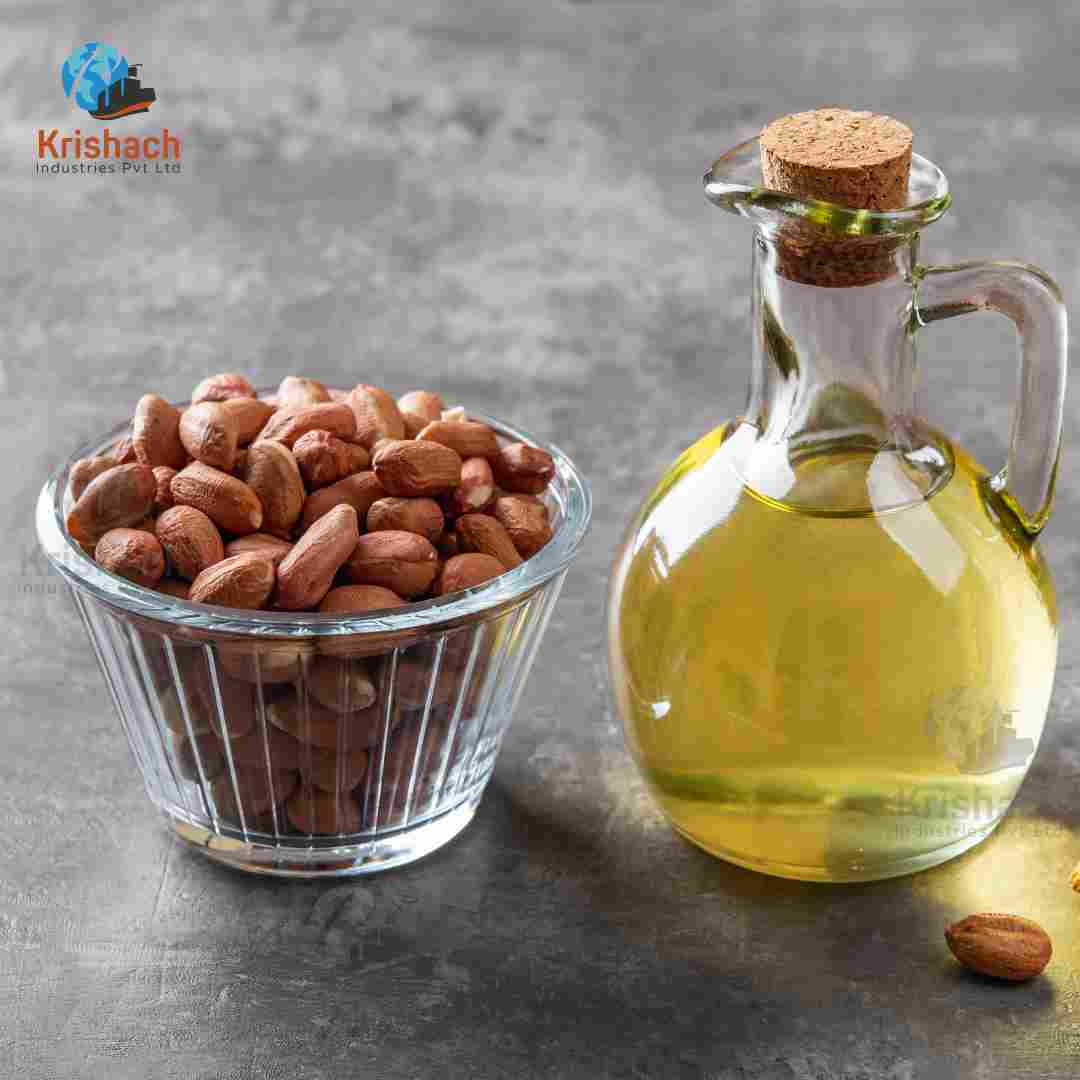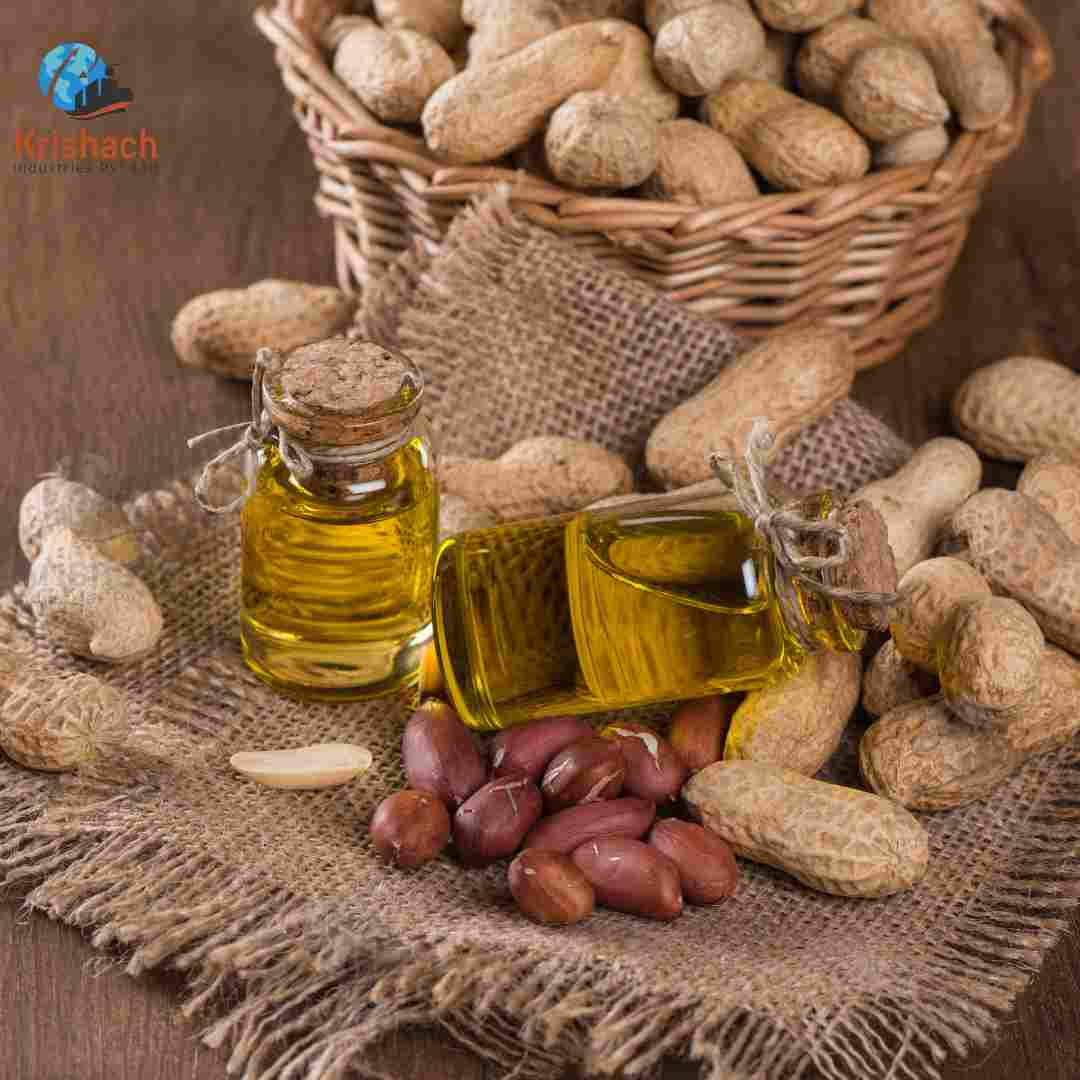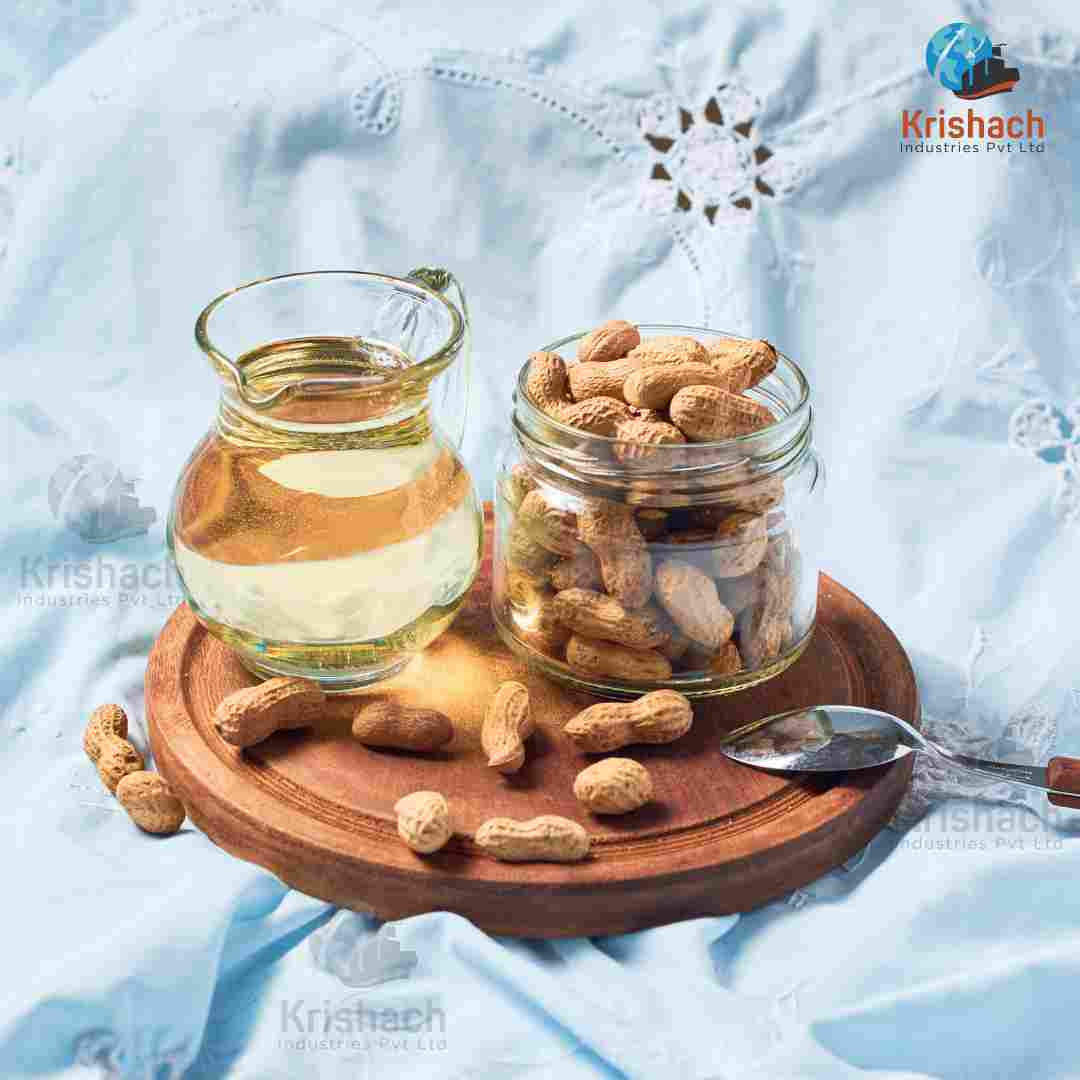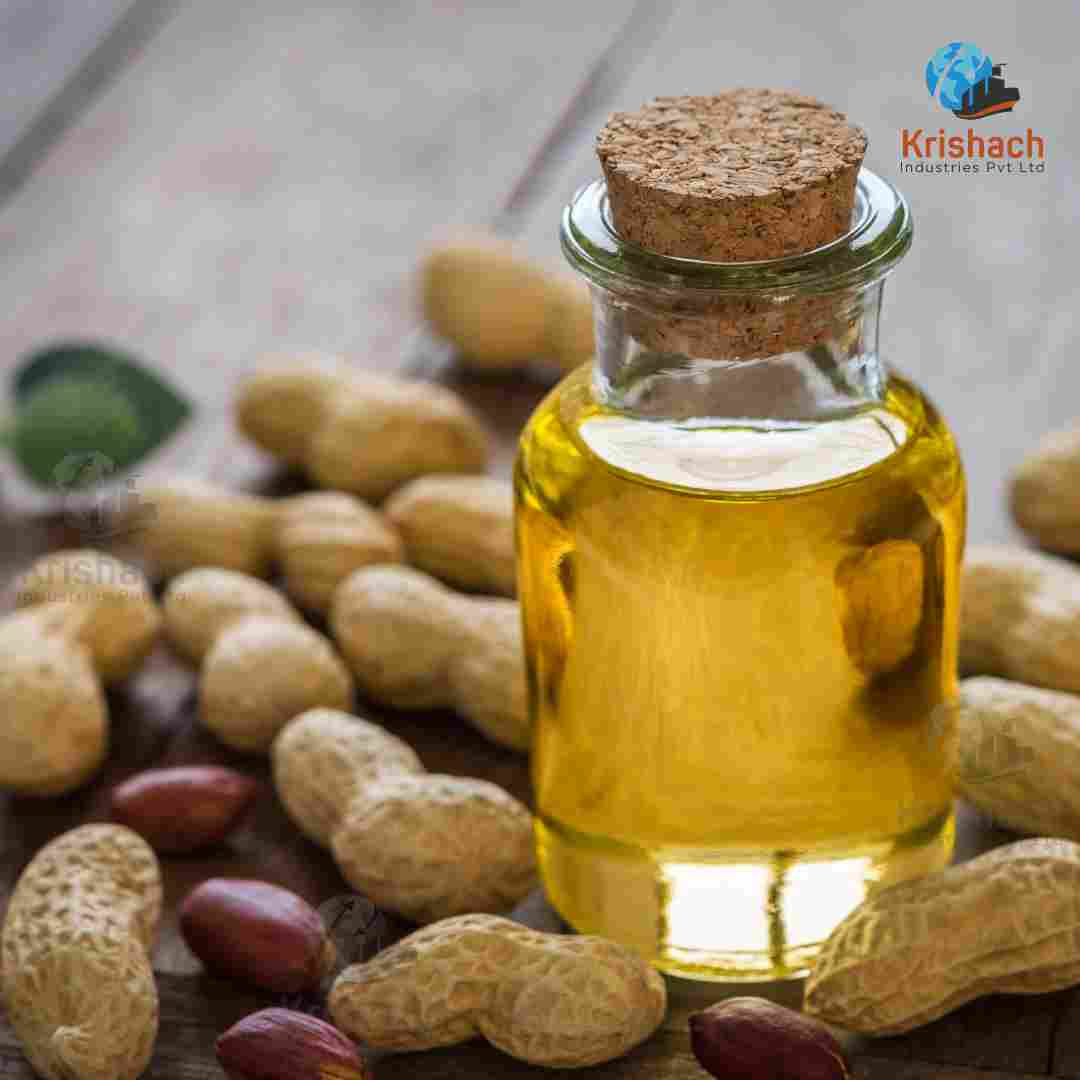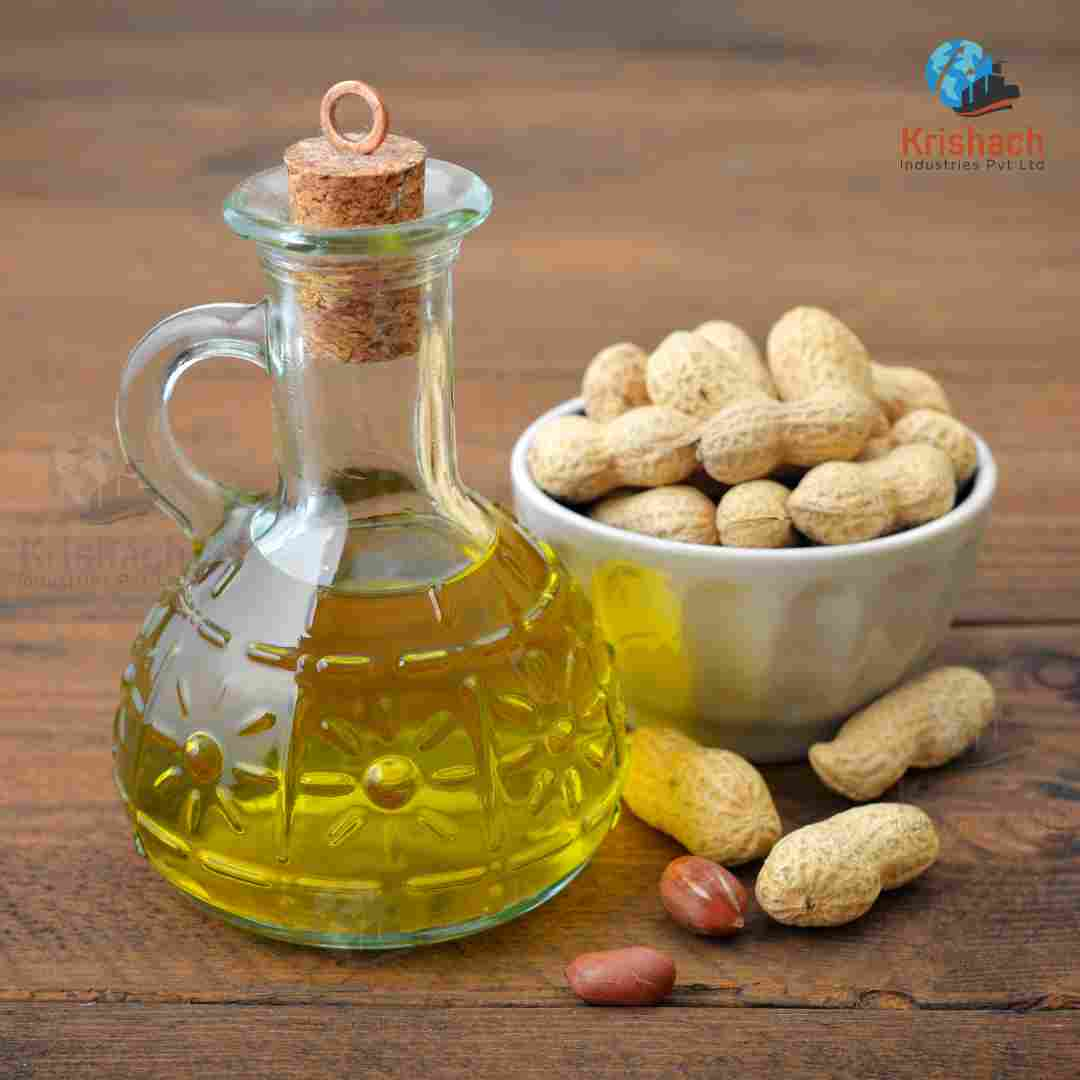Groundnut oil, also known as peanut oil, is a light, golden-yellow vegetable oil extracted from peanuts (Arachis hypogaea). It is widely used in cooking, especially in Asian, African, and South American cuisines, due to its mild flavor, high smoke point, and versatile culinary applications. Groundnut oil is valued not only for its pleasant taste but also for its nutritional benefits, as it is rich in monounsaturated and polyunsaturated fats, making it a heart-healthy option.
Key Characteristics:
Appearance: Light golden yellow to pale amber in color, with a clear and bright consistency.
Aroma: Mild, nutty fragrance, characteristic of peanuts. The aroma can be more pronounced in unrefined or cold-pressed versions.
Flavor: Subtle, slightly nutty taste that enhances the natural flavors of food without overpowering them. Refined groundnut oil has a more neutral taste, while unrefined versions retain a stronger nutty flavor.
Smoke Point: High smoke point of around 450°F (232°C), making it ideal for deep-frying, sautéing, and other high-heat cooking methods.
Nutritional Profile: Contains a balanced mix of monounsaturated and polyunsaturated fats, with low saturated fat content. It is also a good source of vitamin E, an antioxidant that helps protect cells from damage.
Specification:
Uses:
Culinary: Groundnut oil is commonly used for frying, roasting, and baking due to its high smoke point and neutral taste. It is especially popular for deep-frying snacks like fries, samosas, and fritters, as it doesn’t absorb the food’s flavors.
Salad Dressings and Marinades: Its mild flavor makes it suitable for use in salad dressings, dips, and marinades, where it can blend well with other ingredients.
Cosmetic and Industrial: Groundnut oil is also used in the production of skincare products, soaps, and massage oils due to its moisturizing properties. It is sometimes used as a base for medicinal oils and in the manufacturing of biodiesel.
Health Benefits:
Heart Health: Rich in heart-healthy fats, groundnut oil helps to reduce bad cholesterol (LDL) levels while maintaining good cholesterol (HDL).
Antioxidant Properties: Contains vitamin E, which has antioxidant effects that help protect the skin and body from oxidative stress.
Anti-Inflammatory: The presence of resveratrol in peanut oil can help reduce inflammation and improve cardiovascular health.
Our Services
Reliable Sourcing:
The quality of groundnut oil begins with the reliable sourcing of high-grade peanuts. Groundnut oil production in India is predominantly centered in states such as Gujarat, Rajasthan, Tamil Nadu, Karnataka, and Andhra Pradesh, where the climate and soil conditions are ideal for cultivating peanuts with optimal oil content and flavor. Reliable sourcing involves partnering with local farmers who practice sustainable and ethical farming methods. Farmers are encouraged to use non-GMO seeds and minimal pesticides, ensuring that the peanuts are grown in accordance with organic and Good Agricultural Practices (GAP). Building long-term relationships with these farmers helps secure a consistent supply of high-quality peanuts and supports the local agricultural community.
Premium Quality Assurance:
Maintaining premium quality assurance for groundnut oil requires rigorous quality control measures at every stage of production. After harvesting, peanuts undergo stringent inspections to ensure they are free from aflatoxins, moisture, and other contaminants. Only the finest, mature peanuts are selected for oil extraction. The oil is produced in facilities adhering to international food safety standards such as ISO, HACCP, and FSSAI certifications, which guarantee that the oil is processed under hygienic conditions and is safe for consumption. Quality assurance also includes regular testing for purity, flavor, and nutritional content, ensuring the oil retains its natural aroma, taste, and beneficial properties. Ensuring the absence of any residual solvents, pesticides, or heavy metals is crucial for premium-grade oil.
Process:
The processing of groundnut oil involves several steps to ensure that the final product is of the highest quality:
Cleaning and Shelling: Freshly harvested peanuts are first cleaned to remove dirt, stones, and other foreign particles. The cleaned peanuts are then shelled to separate the kernels from the outer husk.
Grading and Sorting: The kernels are sorted based on size and quality, with defective or damaged peanuts being removed. This ensures uniformity and enhances the efficiency of oil extraction.
Roasting: For cold-pressed or unrefined groundnut oil, the sorted peanuts may be lightly roasted to enhance the flavor and aroma of the oil. Roasting also aids in the extraction process by releasing the natural oils in the peanuts.
Oil Extraction: The prepared peanuts are then crushed using mechanical presses. Cold pressing is preferred for producing high-quality oil as it retains more nutrients and the natural flavor of the peanuts. For refined oil, the extracted oil undergoes further processing, such as degumming, neutralization, bleaching, and deodorization, to remove impurities and enhance stability.
Filtration: The extracted oil is filtered to remove any solid particles or residues, resulting in a clear and pure product. This step is essential to maintain the oil’s quality and shelf life.
Quality Testing: The filtered oil is subjected to rigorous quality testing to ensure it meets the required standards for purity, flavor, and nutritional content. This includes checking for the presence of contaminants, acidity, and the overall stability of the oil.
Packaging: Once the oil passes all quality checks, it is packed in food-grade containers that are airtight and light-resistant to prevent oxidation and preserve freshness. Different packaging formats are used, including bottles, cans, or drums, depending on the intended market and consumer needs.
Storage and Distribution: The packaged oil is stored in cool, dry conditions to maintain its quality and is then distributed to markets, ensuring it reaches consumers in optimal condition.
Packaging, Shipping & Delivery
Glass Bottles:
For retail and premium segments, Ground Nut oil is commonly packed in glass bottles ranging from 250 ml to 1 liter. Glass helps preserve the oil’s flavor, aroma, and nutritional value while offering a high-quality, premium appearance. These bottles are typically sealed with tamper-evident caps to ensure freshness and prevent contamination.
PET/HDPE Plastic Bottles:
For larger retail quantities, plastic bottles made from food-grade PET or HDPE are used for packaging sizes ranging from 500 ml to 5 liters. These bottles are lightweight, durable, and resistant to damage during transportation. Tamper-proof caps or spouts are used for ease of pouring and preservation.
Tin Cans:
Ground Nut oil for export or bulk use is often packaged in 15-liter or 5-liter tin cans. These metal containers provide excellent protection from light and air, ensuring the oil’s freshness and long shelf life, especially during long-distance transport. Tin cans are strong and durable, making them ideal for large-scale distribution.
Drums and Barrels:
For industrial or large-scale use, Ground Nut oil is packed in large food-grade drums or barrels, typically made of stainless steel or HDPE plastic, ranging from 50 liters to 200 liters. These containers are used for export or wholesale distribution and ensure the oil remains uncontaminated during transit.
Vacuum-Sealed Pouches:
In smaller retail quantities, Ground Nut oil can also be packed in vacuum-sealed pouches to prevent oxidation and preserve its freshness. This type of packaging is lightweight and ideal for travel-size portions.
Carton Boxes and Palletization:
Once bottled or canned, the Ground Nut oil containers are packed in corrugated cardboard boxes for extra protection during transportation. For large exports, these boxes are palletized and wrapped with stretch film or shrink wrap to ensure stability and safety during shipment. Palletization makes the handling of large quantities easier and reduces the risk of damage.
Export Documentation:
Handle all necessary export documentation, including phytosanitary certificates, certificates of origin, and any specific certifications required by the importing country.
Efficient Shipping:
Partner with reliable freight forwarders and logistics companies to ensure timely and safe delivery of goods. Offer multiple shipping options (air, sea, or land) based on customer preferences.




